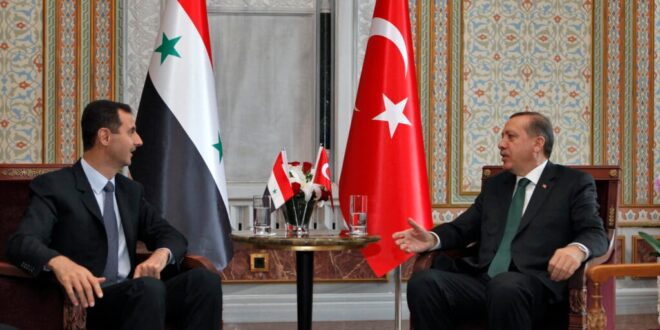Syrian President Bashar al-Assad told the country’s parliament on August 25 that initiatives to revive relations with Turkey had not yielded “any results worth mentioning despite the seriousness and genuine keenness of mediators.” This declaration comes after both Turkish President Recep Tayyip Erdogan and Assad signaled that they were interested in restoring diplomatic ties for the first time since relations broke off in 2011.
Turkey’s warm relationship with Syria abruptly ended after the beginning of Syria’s civil war in 2011 and Assad refused to heed Erdogan’s calls to relinquish power. Over the last 13 years, Ankara has provided material support to rebel groups inside Syria, including radical extremist militias with direct ties to al-Qaeda, in order to overthrow the Assad regime.
Erdogan’s efforts to foment regime change were a costly failure. By 2020, Ankara was forced to recognize that Turkey’s initiative in Syria was doomed. Russia — an ally that was key in providing a lifeline to Assad — has since pressured Ankara to rebuild ties with Damascus.
At a NATO summit on July 11, Erdogan said that he would be extending a formal invitation to Assad to either come to Turkey or meet in a third country. Assad responded by stating that a meeting with Erdogan would occur only if it addressed both ending Ankara’s support for anti-Assad militias and the complete pullout of Turkish forces from Syrian territory. However, Assad subsequently withdrew his insistence on preconditions by claiming that he would be open to talks “as long as they are based on respecting the sovereignty of the Syrian state over all of its territory and fighting all forms of terrorism.”
On July 23, Turkey’s Daily Sabah newspaper, citing an unidentified source, claimed that a meeting between Assad and Erdogan could occur in Moscow as early as August with Russian President Vladimir Putin acting as a mediator. However, a Turkish diplomatic source immediately denied that there was any set plan, and Assad’s most recent comments make it clear that an August meeting is off the table. Despite the delays, Assad continues to highlight that he is not waiting for a withdrawal of Turkish troops.
Erdogan’s desire to normalize ties with Syria is likely to threaten the security interests of the United States and its partners by endangering the Syrian Democratic Forces (SDF). The Syrian Kurds, coalesced under the banner of the SDF, are a vital partner of the United States. They play a key role in continuing to fight the remnants of the Islamic State (ISIS) and ensuring that the terrorist group is not in a position to rebuild its forces.
An Erdogan-Assad rapprochement could, according to regional analyst Ibrahim Hamidi, result in a joint Syrian-Turkish military offensive to rout the SDF. This offensive would aid Erdogan in his quest to eliminate the so-called “Kurdish threat,” which Turkey ties to the SDF, while Assad would regain further control over Syrian territory.
Erdogan’s willingness to reconcile with Damascus likely stems from his desire to placate Turkish voters. The Turkish population is facing the worst economic downturn in their country’s history. Likewise, Turkey’s citizens are feeling increasingly overwhelmed by the flow of Syrian refugees. To address these problems, Erdogan is interested in securing Assad’s cooperation to repatriate the more than 4 million refugees living in Turkey.
In any given scenario, the rebuilding of substantive ties between Erdogan and Assad would likely require the departure of the U.S. military presence inside Syria, which has been assisting the SDF’s counter-ISIS mission. Washington should closely monitor ongoing deliberations between Damascus and Ankara and impress upon Turkey that the SDF is a vital U.S. partner in ongoing counterterrorism efforts.
 Eurasia Press & News
Eurasia Press & News




